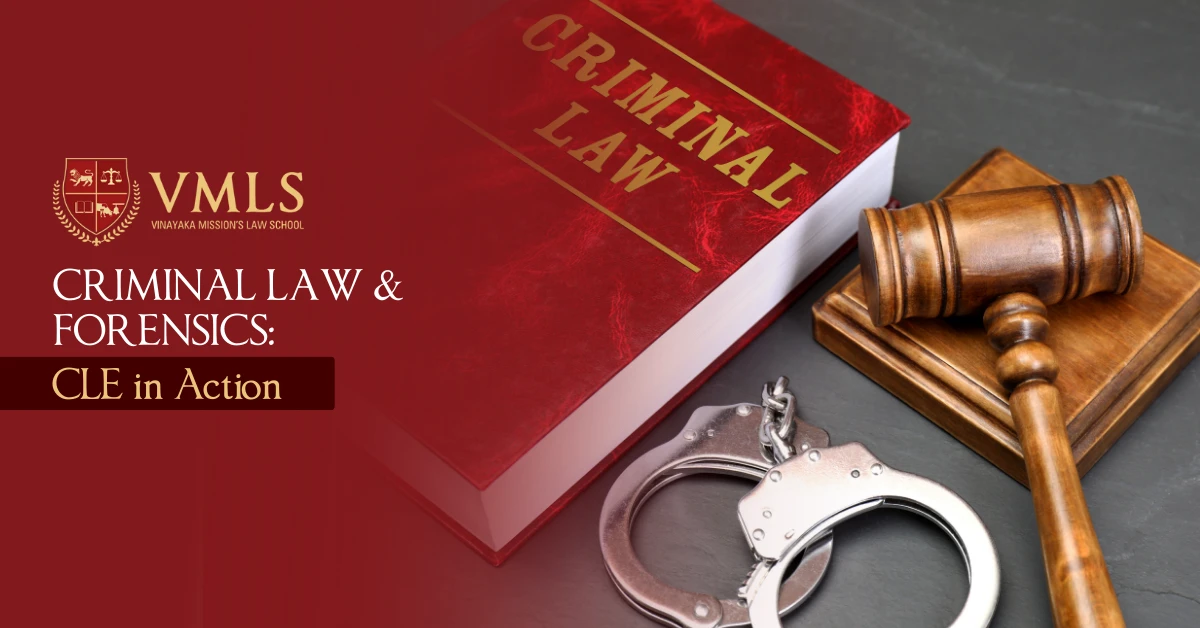June 29, 2025
0 Views

In every murder case there are two stories: the one we hear in court and the one we find at the crime scene. Sometimes justice is found or lost somewhere between these two stories and to actually tie them up, we need more than a legal understanding; we need to understand how forensic science and criminal law work together to uncover the truth.
This is the exact intent of Clinical Legal Education (CLE) at Vinayaka Mission’s Law School (VMLS), Chennai. Through CLE, criminal law is brought to life not just through statutes and case law but through investigative methods and analytical skills and fora in the courtroom. It is one thing to teach a student the language of Section 302 of the IPC; it is quite another to teach them how bloodstains or autopsy findings or digital trails constitute both support and challenges to a legal argument.
CLE requires students not only to look at case files intensively but also to read forensic evidence and how it is used in court. Students work alongside attorneys, forensic experts (sometimes police officers), and other students in tracking evidence from the crime scene to the courtroom and where mistakes can happen.
In India justice is not always served due to weak laws, but due to poor investigation, tampered evidence, misstatements of witnesses, or slow delivery of forensic reports. CLE involves students in these real-world issues, with activities like mock trials, work related to legal aid, and so on to showcase the repercussions of slight forensic errors and legal procedural mishaps.
For our 3- and 5-year law students, specialized clinical modules in criminal litigation, criminal forensics, and justice reform are not optional additions; they are embedded within the curriculum. Students write bail applications that depend on bad forensic reports, prepare cross-examinations from chemical evidence, and meet with real clients whose lives have been altered by a missed lab test or a missed injury report. Justice depends on the quality of evidence and the skill of people trained to interpret it, they learn.
A fingerprint or an unconvincing confession are not only a procedural mishap; they matter in the lives of the defendants. Students learn from clients who have been sitting in prison for years waiting to be tried for crimes they couldn’t prove, trials that have become delayed due to unconvincing forensic evidence.
The faculty at VMLS not only imparts academic knowledge of the laws or forensic science but also develops students’ critical thinking, ethical judgment, and long-term drive for justice. These are all necessary skills in a country where dubious convictions and delays occur quite often.
Of course there are issues. You need infrastructure, forensic science faculty, and collaboration from industry and education. The outcomes are obviously worth it: graduates who know their law, have an investigative disposition, and are socially conscious.
Clinical Legal Education A society dominated by news of crime and courtroom drama is filled with the illusion that every case has a human story. Clinical Legal Education helps remind us of this point: criminal law is about finding the truth, not punishing the guilty, and often the truth lies in the most trivial things.
At VMLS, we ask our students to look for those details. To understand them. To use those details not just to win cases, but to defend the law.
Several students across India are choosing law as a career due to the various benefits it offers.
The 3-year LLB (Bachelor of Legislative Law) programme is an undergraduate programme designed to cater...
Vinayak Mission's Law School (VMLS) is one of the best law schools in India and is being mentored by O. P. Jindal Global...
In India, law is seen as a noble career option, and the number of students interested in pursuing law is increasing.
If you are willing to work in a legal advisory firm, judiciary, or as a lawyer, then pursuing a law degree plays...
CLAT is a national-level entrance exam, and it stands for Common Law Entrance Test. Many top law universities in India.
Many students are developing their interest in law and several fields related to legal studies. After the 12th exam...
Many students in India choose law as a career due to the various benefits this field offers. Although there are several..